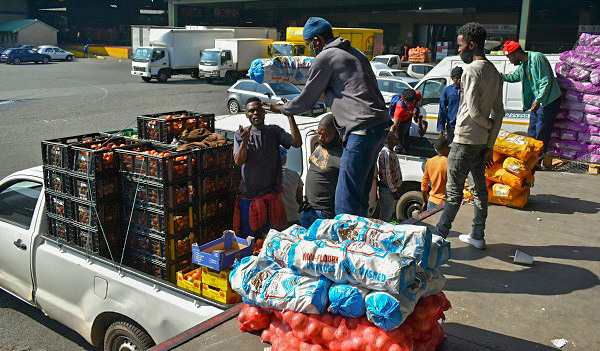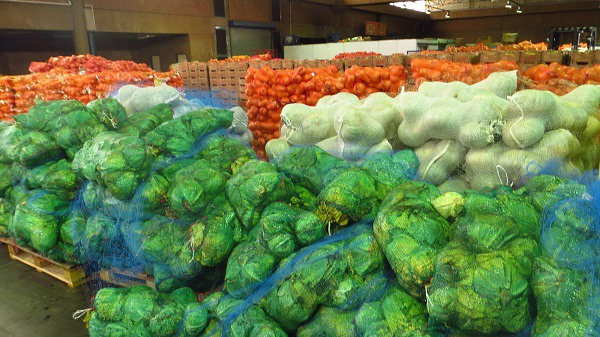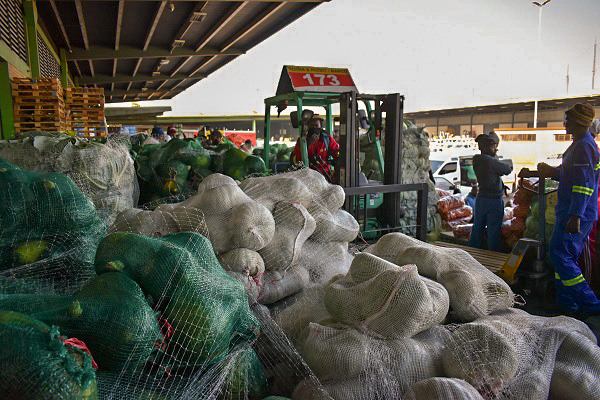Dr Justy Range loves the elegance of South Africa’s municipal markets, often called unique for the way it calls into existence a sphere of trading seemingly governed by an ‘invisible hand’.
“And unique it is: this model is not found anywhere else in the world, either in its form or its scale. But this uniqueness is both its strength and its weakness,” he cautions.
Dr Range is the chairperson of the board of Technofresh, the web-based market reconciliation system used at all of South Africa’s municipal markets and developed by Freshmark Systems.
All welcome on the commons
South Africa’s municipal markets accept everything from unwashed, unsorted crates of tomatoes to high-value packaged fruit. “From the informal buyer who needs to purchase a single box of produce, all the way to a buyer who purchases a truck full of produce: all come together every day to compete and negotiate prices.”
Its power lies in its ability to collectively and transparently ‘discover’ the most optimal price depending on the ultra-specific conditions reigning during the point of sale, resulting in prices vastly more sensitive to economic stimuli than retail prices.
“The commission market does not belong to a singular stakeholder. It has to be an inclusive and transparent environment in order to ensure buy-in from all participants.”
National municipal market data such as stock levels and prices are freely available to all market users and the general public. This transparency doesn’t come naturally to businesses, he observes, but it is a keystone of the municipal market system which is, all the while, highly regulated and competitive.

Anyone is welcome to buy and sell on the country's municipal markets
Agents need to apply for a trading license and floor space are allocated on a performance basis, calculated according to their turnover.
Farmers appreciate the transparency of seeing the prices across the country. They can play the markets, selling where returns are most favourable on a day-to-day basis and consign produce to whichever agents they fancy, without costly contractual obligations. Cash payments to farmers of the day’s sales are paid over as quickly as 24 hours after the transactions.
At the market farmers also make use of subsidized storage space and ripening and cooling facilities.
“If the market operates optimally it becomes a low-risk environment, a model of how to create easy access to market, where a small-scale farmer enjoys the same protection and accessibility to buyers as one who puts down 400 pallets per day.”
He maintains that this dynamic is what makes South Africa’s market system fundamentally different from conventional wholesale markets in the UK and Europe, even across the world. He refers to it as a self-regulating but fragile symbiotic eco-system which made it a pivotal player in the growth of the South African horticultural sector.
The potato floor at the Johannesburg municipal market
Monopolistic behaviour organically neutralized
“The market model’s uniqueness lies deeper than its ability to deliver food and transparently ‘discover’ the most optimal price,” notes Dr Range, who earned his doctorate in Informatics focusing on South Africa’s municipal markets.
“Aspects like price discovery and the required levels of trust and transparency are an outcome of a very specific institutional market structure. The commission market’s structure emerged over many generations (and iterations) to systematically address the various market ‘problems’ that affect trading environments. The result is a form of public good, inherited from these previous generations.”
The municipal market concept was set up and run as an interventionist project in the 1950s to assist small-scale farmers in accessing formal markets: ironically, he points out, the same challenge South Africa is facing at the moment.
“This institutional arrangement in its pure form pushes back against the ‘normal’ opportunistic forces present in all trading arrangements like the concentration of power, uncompetitive behaviour, conflicts of interest, collusion and price fixing which are naturally present in all trading arrangements, regardless of the industry.”
To remain a level playing field between farmers, buyers and agents - “a commons” Justy likes to call it – the roles and boundaries of each actor are prescribed and regulated.
He is quick to point out that the municipal market system is not a typical free-market pricing environment: when looking at the day-to-day price negotiations, power is concentrated with the agent as the mandated representative of a grower. The agent, therefore, has the power to decide the price of the produce on a spot transaction basis while ownership of the produce stays with the grower until the transaction is confirmed with a buyer on the central system.
“A more accurate description might be an oligopolistic market structure in which the concentration of power is diluted by a highly competitive and regulated environment. The market organically dilutes monopolistic behaviour through competition between the various agencies which, in turn, is supported by the free flow of information and transparent data distribution. In this way, short-term monopolistic behaviour is neutralized over the longer term.”
He puts forth that it is important when the discussions around competition on markets and the design of future markets are considered. Understanding that the dynamics that shape competition does not emerge organically but has to be provided for.”
“If you want to see what food security looks like, visit the municipal markets”
“In South Africa we have fresh food flowing to these facilities every day despite disruptions, despite bad roads, despite loadshedding– that’s a good story, and what makes it even more remarkable is that only 5% of the country is suitable for intensive horticultural production. The effectiveness of the South African farming community is astonishing. And our markets play a vital role in getting fresh food to people daily.”
He has always found it questionable why housing and water are prioritized in South Africa over food security, ironically because of the success of the municipal markets in sustaining food security, with minimal input from the government.
Municipal markets make the difference to whether someone in an informal settlement can afford to eat vegetables along with their starch or protein; roughly two-thirds of the buyers at these markets take food into the informal value chain.
The watermelon floor at the Johannesburg market in City Deep; one of the last products to be sold by auction on the fresh market until a few years ago
Throughout the Covid period, the volumes traded at the municipal markets never wavered. “Apart from the initial shock and adjustments at the beginning of the pandemic, the markets continued to deliver their services with limited reduction in throughput.”
In fact, he adds, there was a notable increase in buyers registering to trade and fill the vacuum left by the disruption of food supply in the more formal retail supply chains.
“If you want to see what food security looks like, go to the Johannesburg market on a Thursday morning, or any of the markets in the major cities. Walk outside where small buyers make up their parcels of tomatoes, carrots, potatoes, onions, bananas – that product is fresh, it’s fresher than you’d probably get in a retailer, and the price was negotiated – isn’t that what food security looks like?”
Buyers from Zambia, Zimbabwe, Angola, the Democratic Republic of the Congo, Namibia, Botswana, Mozambique, Mauritius come to these markets (especially the Gauteng markets).
“Through this market system flows millions of tonnes per annum. Millions of people are fed through this market system, regardless of all the challenges. That shows you that the construct we have here, is a cornerstone to food security in the region. It is saddening that the authorities do not understand and do not treasure the stability these markets provide to food distribution.”
Despite dissatisfaction, markets keep ticking over
However, the markets are rarely in the news for their merits.
More commonly, South Africans hear about the longstanding dissatisfaction with the state of market facilities which are meant to be maintained with the monies the market brings in. (Or they hear about the Competition Commission’s recurring enquiries into anti-competitive behaviour at the markets.) The markets are in desperate need of recapitalization and a re-think to raise the profile of a strategic state asset, Justy says.
He remarks that the strategic role these markets can and should play in food security and food safety, transformation, commercial scalability and so forth are overshadowed by the short term priorities.
Vegetables at the Tshwane market
Municipal markets are sites of political contestation, as municipalities themselves are. He regards it as shortsighted and disingenuous to place all blame for the deterioration of market facilities on the market management when it is well-known how their hands are tied by bureaucracy, ostensibly to curb corruption.
“It is not the management of the market but the environment they have to operate in. The CEO of the Tshwane market can’t even sign off on a lightbulb without the permission of the municipality’s supply chain. The strictness of the supply chain processes does take away the market management’s operational flexibility.”
He continues: “Discussions on the future of markets focus inevitably on operational, management and sometimes cosmetic aspects. And yes, a lack of maintenance is having a severe and disastrous impact on the effectiveness of these markets. It takes a deep understanding of its inner workings as well as a specific ideological approach to unlock the true value.”
Incidentally, South Africa’s new (and first) Minister for Electricity, Kgosientso Ramakgopa, was also earlier the manager at Johannesburg market.
Tragedy of the commons
And yet, despite the complaints and disruptions, trade continues to grow. “Therefore,” he maintains, “the current conversation we’re having about the market is missing a crucial component. We don’t only have an infrastructure or market management problem. We have an existential problem: The operational challenges are creating an environment where opportunism and anti-competitive behaviour from within, if left unchecked, will ultimately lead to its weakening and destruction. The signs are there.”
He posits that the dilution of any of the key building blocks of the commission market model leads to a dilution of its commercial, economic, social and political impact.
“The private sector doesn’t solve developmental problems, they only solve their own profit problems. The markets in South Africa are a very good case study in how a public/private arrangement can address problems of poverty and food security with the right balance between state intervention, infrastructure development and the private sector – that is, if everybody does their part. That’s why it is helpful to refer to the tragedy of the commons when talking about the markets.”
The story of how important the markets are, is not being told enough, he says. “It is a fantastic example of social engineering bringing diverse interests together with a largescale socio-economic benefit broader than just the bottom line.” For more information:
For more information:
Dr Justy Range
Freshmark Systems
Tel: +27 43 721 1123 / 43 721 3585
Email: [email protected]
https://www.technofresh.co.za/
